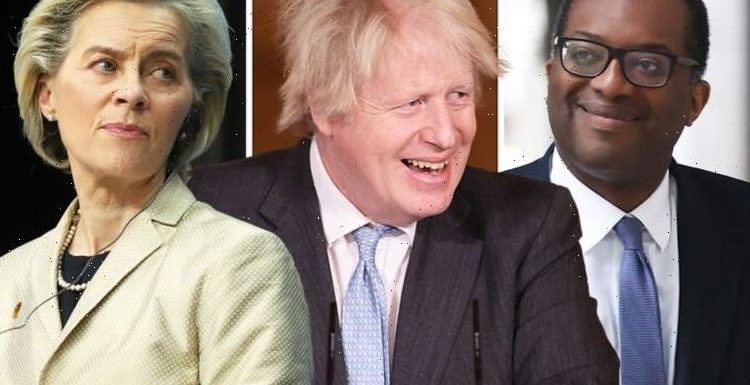
Lord Frost gives update on UK’s participation in Horizon Europe
We use your sign-up to provide content in ways you’ve consented to and to improve our understanding of you. This may include adverts from us and 3rd parties based on our understanding. You can unsubscribe at any time. More info
Mr Kwarteng said he “fully supports” Science Minister George Freeman’s “Plan B” for Horizon Europe. Horizon Europe is the EU’s key £80billion research and innovation that the UK was meant to participate in, but was banned from over Brexit disputes. Now, Mr Freeman has been drafting up a “Plan B” as an alternative. Speaking to the Science and Technology Committee today, Mr Kwarteng said: “Frankly, over the year, looking at what we get out of Horizon, the costs, I think we can actually operate Plan B successfully.
“I think it is a finely balanced situation… we have got great science.
“We demonstrated that in the vaccine roll-out. There are huge amounts of investment. When I travel around the world people are really really keen to invest in UK innovation.
“We have got a great story, and I think that Plan B.. can really work very well.
“We’re working full steam ahead.”
Instead of handing the EU £15billion over a seven-year period so British scientists can collaborate with European partners and access the EU’s pool of funds, Plan B will be looking elsewhere.


Mr Freeman has hinted that the Plan will involve teaming up with science and innovation powerhouses like our Five Eyes (Australia, Canada, New Zealand, the US) partners, as well as countries like Japan.
In fact, in Mr Freeman’s last appearance before the Science and Technology Committee, he agreed that universities in the US, Australia and Asia are of “better quality” than those in Europe.
And the Science Minister already appears to be making progress in striking up partnerships with non-EU countries.
Mr Freeman headed to Geneva this week to explore the possibility of collaborating with Switzerland, which has also been banned from Horizon Europe over a political feud.
The Science Minister posted on Twitter: “To Switzerland this evening for a two-day trip to explore a UK/Swiss science and research collaboration.

“The UK and Switzerland are science powerhouses with huge, shared research interests.
“Between us, we have nine out of 10 of the top Universities in Europe.”
British scientists had been left in the dark for months as to where their funding would come from, and feared their European partners would slip away.
Ludovic Thilly, chair of the executive board at Coimbra Group, said: “We cannot accept any longer that scientific cooperation be held hostage to bilateral politics.”
Mr Freeman set up contingency plans to assure Horizon Europe applicants that they will still get grants even if Britain’s participation is blocked.
DON’T MISS
Boris Johnson’s green nuclear revolution falling apart [INSIGHT]
History of Scotland ‘needs rewriting’ after bombshell colonial find [REVEAL]
Putin strikes! Russia cuts gas supply after Biden’s troops make ‘de… [REPORT]


And this may happen if Foreign Secretary Liz Truss fails to strike a deal with EU negotiators, risking an Article 16 trigger that would see Britain permanently excluded.
This is despite the fact that Britain’s participation was a part of the EU–UK Trade and Cooperation Agreement
But now, Britain’s researchers may feel a bit more confident following Mr Freeman’s announcement.
In another post, Mr Freeman said: “14 months ago in the EU Withdrawal Agreement we negotiated to join the Horizon Research Programme.
“If our Association continues to be blocked, we cannot allow UK science to suffer through EU politics.
“So, I am developing a £6billion Global Britain Science Plan.”
Source: Read Full Article